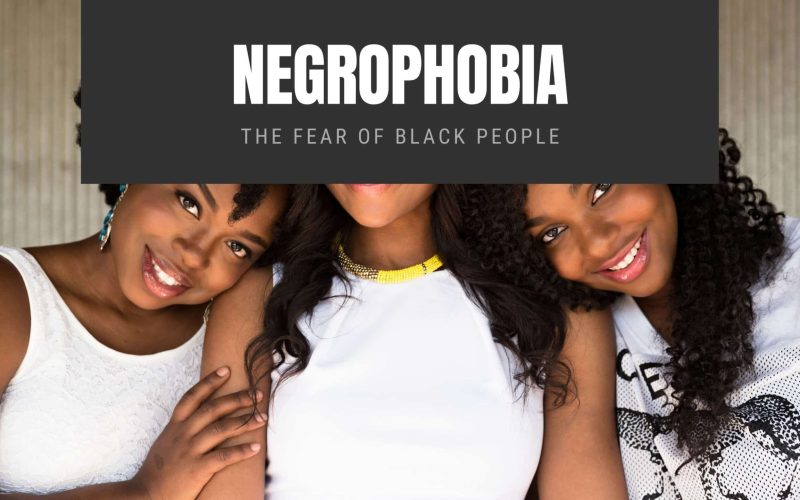The word ‘’Negro’’ meaning ‘’black’’ is used to refer to the race native to Africa because of their dark skin color. Negrophobia is the fear or intense aversion to Black people and their culture worldwide.
Negrophobia could be a result of certain factors that may include racism, trauma, and other situations.
The symptoms of Negrophobia may include attributing negative characteristics to black people and black culture, the fear and aversion of black men, and the objectification of black women.
These symptoms, amongst others, may affect your social life and hinder your usual daily lifestyle. Nevertheless, this condition can be treated.
What is Negrophobia?
The term Negrophobia originated from the combination of the Spanish and Portuguese word ‘’Negro’’, which means ‘’black’’ and the Greek word ‘’Phobos’’ meaning ‘’fear or aversion’’.
Therefore, Negrophobia is defined as the irrational fear or severe aversion of black people and their culture. People with Negrophobia are referred to as negrophobes.
‘’Blackophobia’’ and ‘’anti-blackness’’ are relative terms used instead of Negrophobia. Nevertheless, people tend to confuse the word ‘’Melanophobia’’ and ‘’Afrophobia’’ with Negrophobia.
Melanophobia describes the aversion or fear of black or very dark inanimate objects and not humans.
At the same time, Afrophobia is the aversion and fear of African people and culture, irrespective of the origin of their race.
Racism can be used as an umbrella term to denote the terms mentioned above. This is because they are all related to racism.
Racism means the fear and aversion of people of other races, including their culture.
The Historical Context of Negrophobia
The word ‘’Negrophobia’’ first appeared in 1802 and has been widely used all around the world.
The concept was formed to describe the discrimination and violence that black people have to face due to colonization and slavery in Europe and other places in the world.
Even after all these years of black rights movements and slavery abolishment, Negrophobia still exists.
Black Negrophobia
Although Negrophobia is common amongst white people, a handful of black people are found to be negrophobic.
The term “Black Negrophobia” was first coined by a psychiatrist named Frantz Fanon to define the aversion of back people and their culture by black people themselves.
This is internalized racism against one another and is believed to exist as tribalism and colorism.
As suggested by Frantz, this could be a result of living in a society that paints black people as evil people and the diversity that exists in black communities.
The nature of colonialization in the colonialized countries is believed to contribute to black Negrophobia.
The symptoms of black Negrophobia include:
- Rejecting native or ethnic language while taking on European languages
- Choosing European or white cultures over black cultures
- The tendency to surround themselves with lighter-skinned people rather than darker-skinned ones
- The attribution of negative characteristics to people, culture, and things of the black race
- Discriminatory attitudes towards light-skinned black people because ‘’they look too white to be black.’’
Causes of Negrophobia
Just as with other phobias, Negrophobia has no particular cause, but experts believe that the following may serve as predisposing factors that contribute to the development of the condition.
Traumatic Experience
Traumatic events are common factors known to trigger phobias. A person of other race who must have had a traumatic experience about black people may become negrophobic.
A person who must have been raped, robbed, kidnapped, or have a friend with an ugly encounter with black people is likely to be negrophobic
Background Upbringing
The environment has a significant influence on a person’s life. People of other races that were taught to believe that their race is superior to that of the black race are likely to grow up with Negrophobia.
More so, persons who grew up in a society where they were made to believe that all black people are dangerous have a higher chance of living the rest of his or her lives fearing black people.
Also, black people who were led to believe that white people are superior to their race may grow up having black Negrophobia. Following colonization, Africans and black people were made to change their perceptions.
They were made to see their tradition and culture as evil and unacceptable, and they chose to adopt the culture of Europeans that colonized them.
Racism
Racism is the repulsion or prejudice against people of other races. Persons who are racists are most likely to be negrophobic.
Treatment of Negrophobia
No phobia has a specific treatment that is guaranteed to cure a phobia, but medications and therapy have been adopted to help the individual recover.
Therapy
When a sufferer sticks to their scheduled sessions with their consulting therapist, they are likely to recover from Negrophobia. Therapists may use the following approaches:
Cognitive-behavioral Therapy (CBT)
This is the most common method used in the treatment of phobias. Your therapist would likely help you identify negative thought patterns you have about black people and replace them with positive ones.
After that, your therapist will help you adopt coping skills that will help you overcome your fears when facing them.
Dialectical Behavior Therapy (DBT)
DBT is usually used in the treatment of some personality disorders, but it can also be used in treating specific phobias, including Negrophobia.
People with Negrophobia may be asked to join a group where coping strategies are taught. These coping strategies empower people with Negrophobia to have control over themselves.
Mindfulness-Based Stress Reduction (MBSR)
MBSR is an eight-week program consisting of group meditation classes and a group discussion where everyone can discuss their feelings. In the course of this program, you are likely to meet people with similar issues like you.
With their support and that of the group coach, you may achieve the desired changes in your life.
Medication
Medicines are prescribed to help suppress anxiety. The following are the two types of drugs used in the treatment of phobias, specifically Negrophobia.
- Anti-anxiety drugs: These are drugs known to lower anxiety by forming bonds with the receptor cells of the brain.
- Anti-depressant Drugs: These medications are commonly used in the treatment of depression, but they are also effective in treating phobias by reducing anxiety. They include medicines such as Lexapro.
These drugs are not a cure for any phobia. They may have adverse effects, and extended use may lead to dependence and addiction. As a result, these drugs should be administered strictly on your doctor’s prescription.
Yoga/Meditation
Meditation is a relaxation technique that helps calm the nerves and obtain inner peace. Practicing yoga allows you to escape negative thoughts and channel them into more positive and productive thoughts.








